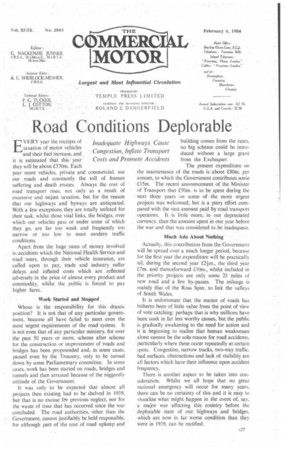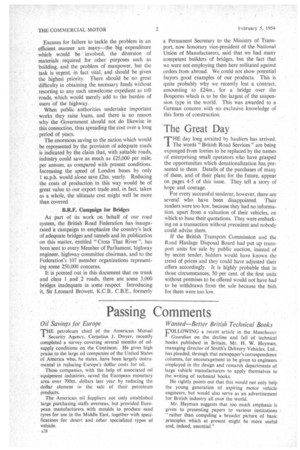Road Conditions Deplorable
Page 29

Page 30

If you've noticed an error in this article please click here to report it so we can fix it.
VERY year the receipts of taxation of motor vehicles and their fuel increase, and it is estimated that this year they will be about £370m. Each year more vehicles, private and commercial, use our roads and constantly the toll of human suffering and death ensues. Always the cost of road transport rises, not only as a result of excessive and unjust taxation. but for the reason that our highways and byways are antiquated. With a few exceptions they are totally unfitted for their task, whilst those vital links, the bridges, over which our vehicles pass or under some of which they go, are far too weak and frequently too narrow or too low to meet modern traffic conditions.
Apart from the huge sums _of money involved in accidents which the National Health Service and road users, through their vehicle insurance, are called upon to pay, trade and industry rsuffer delays and inflated costs which are reflected adversely in the price of almost every product and commodity, whilst the public is forced to pay higher fares.
Work Started and Stopped Whose is• the responsibility for this drastic position? It is not that of any particular government, because all have failed to meet even the most urgent requirements of the road system. Ti is not even that of any particular ministry, for over the past 50 years or more, scheme after scheme for the construction or improvement of roads and bridges has been propounded and, in some cases, passed even by the Treasury, only to be turned down by some Parliamentary committee. In some cases, work has been started on roads, bridges and tunnels and then arrested because of the niggardly attitude of the Government.
It was only to be expected that almost all Projects then existing had to be shelved in 1939, but that is no excuse fdr previous neglect, nor for the waste of time that has occurred since the war concluded. The road authorities, other than the Government, cannot justifiably be held responsible, for although part of the cost of road upkeep and building comes from the rates, no big scheme could be introduced without a large grant from the Exchequer.
The present expenditure on the maintenance of the roads is about 180m. per 'annum, to which the Government Contributes sonic £35m. The recent announcement of the Minister of Transport that £50m. is to be spent during the next three years on some of the more .urgent projects was welcomed, but is a puny effort corn-pared with the vast amOunt paid by road transport • operators. It. is little more., in. our depreciated currency, than the amount spent in one year before the war and that was considered to-,be inadequate.
Much Ado About Nothing' Actually, this contribution from the Government will be spread over a much longer period, because for the first year the expenditure will be practically nil, during the second year flint., the third year and thenceforward ElOm., whilst included in the priority projects are only some 23 miles of new road and a few by-passes. The mileage is mainly that of the Ross Spur, to link the valleys of South Wales.
It is unfortunate that the matter of roads has hitherto been of little value from the point of view of vote catching: perhaps that is why millions have been sunk in far less worthy causes, but the public is gradually awakening to the need for action and it is beginning to realize that human weaknesses alone cannot be the sole. reason for road accidents, particularly where these occur repeatedly at certain spots. Congestion, narrow tracks, two-way traffic, had surfaces, obstructions and lack of visibility are all factors which have their influence upon accident frequency.
There is another aspect to be taken into consideration. Whilst we all hope that no great national emergency will occur for many years, there can be no certainty of this and it is easy to visualize what might/ happen in the event of, ,say, a Major war affecting this country before the deplorable state of our, highways and bridges, which are now in far worse condition than they were in 1939, can be rectified. Excuses for failure to tackle the problem in an efficient manner are many—the big expenditure which would be involved, the diversion of materials required for other purposes such as building, and the problem of manpower, but the task is urgent, in fact vital, and should be given the highest priority. There should be no great difficulty in obtaining the necessary funds without resorting to any such unwelcome expedient as toll roads, which would merely add to the burden of users of the highway.
When public authorities undertake important works they raise loans, and there is no reason why the Government should not do likewise in this connection, thus spreading the cost over a long period of years. • The enormous saving to the nation which would be represented by the provision of adequate roads is indicated by the claim that, with suitable roads, industry could save as much as £25,000 per mile, per annum, as compared with present conditions. Increasing the speed of London buses by only 1 m.p.h. would alone save £2m. yearly. Reducing the costs of production in this way would be of great value to our export trade and, in fact, taken as a whole, the ultimate cost might well be more than covered B.R.F. Campaign for Bridges As part of its work on behalf of our road system, the British Road Federation has inaugurated a campaign to emphasize the country's lack of adequate bridges and tunnels and its publication on this matter, entitled "Cross That River ", has been sent to every Member of Parliament, highway engineer, highway committee chairman, and to the Federation's 107 member organizations representing some 250,000 concerns.
It is pointed out in this document that on trunk and class 1 and 2 roads, there are some 3,000 bridges inadequate in some respect. Introducing it, Sir Leonard Browett, K.C.B., C.B.E., formerly a Permanent Secretary to the Ministry of Transport, now honorary vice-president of the National Union of Manufacturers, said that we had many competent builders of bridges, but the fact that we were not employing them here militated against orders from abroad. We could not show potential buyers good examples of our products. This is quite probably why we recently lost a contract, amounting to £24m., for a bridge over the Bosporus which is to be the largest of the suspension type in the world. This was awarded to a German concern with no exclusive knowledge of this form of construction.
The Great Day
THE day long awaited by hauliers has arrived. The words "British Road Services" are being expunged from lorries to be replaced by the names of enterprising small operators who have grasped the opportunities which denationalization has presented to them. Details of the purchases of many of them, and of their plans for the future, appear on pages 4-5 of this issue. They tell a story of hope and courage.
For every successful tenderer, however, there are several who have been disappointed. Their tenders were too low, because they had no information, apart from a valuation of their vehicles, on which to base their quotations. They were embarking on a transaction without precedent and nobody could advise them.
If the British Transport Commission and the Road Haulage Disposal Board had put up transport units for sale by public auction, instead of by secret tender, bidders would have known the trend of prices and they could have adjusted their offers accordingly. It is highly probable that in those circumstances, 30 per cent. of the first units without premises to be offered would not have had to be withdrawn from the sale because the bids for them were too low.








































































































